learning in foreign shores, the exiled belarusian university
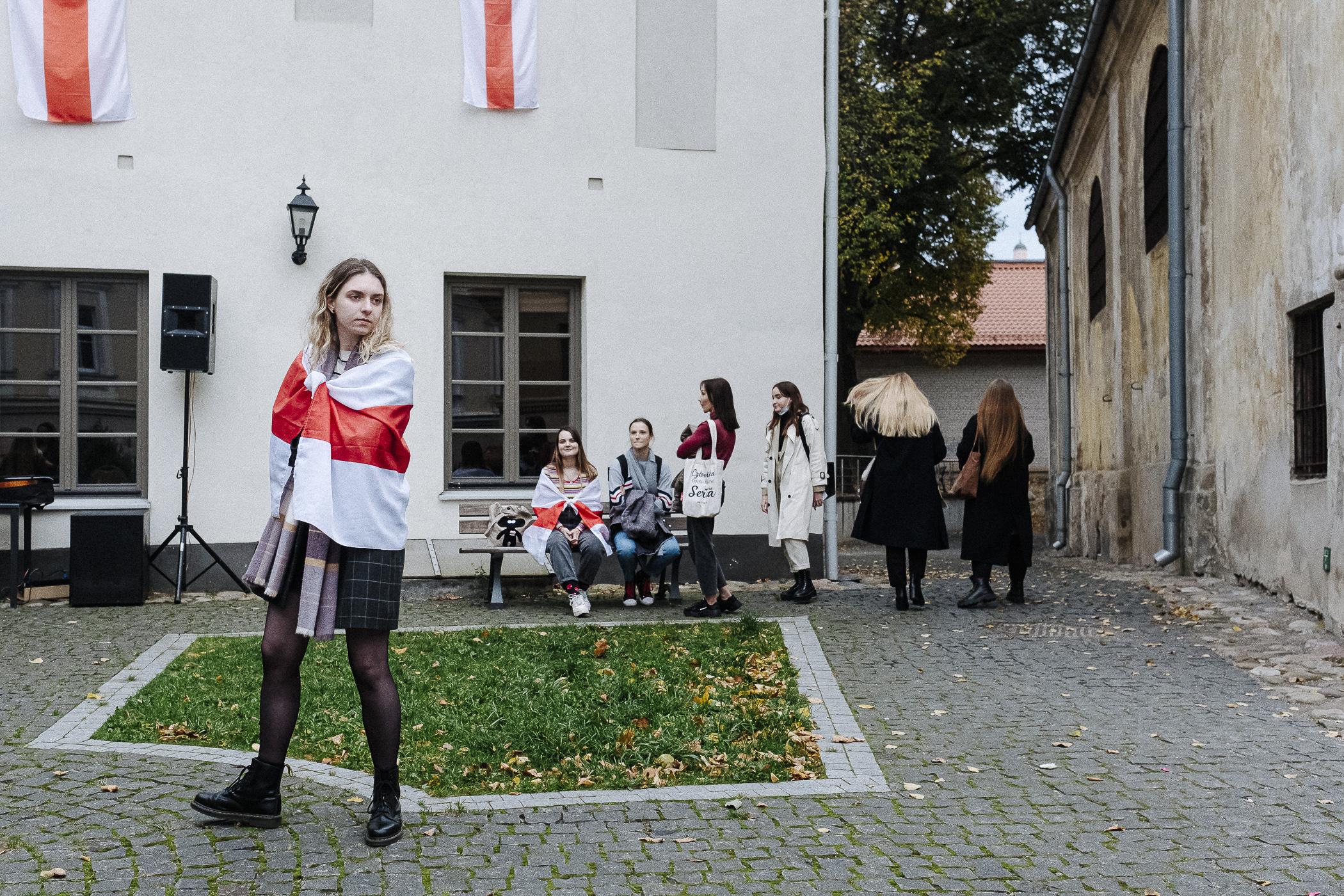
During an evening event held in the courtyard of the European Humanities University (EHU), Yauhenia (19) carries on her shoulders the flag that she and many of her fellow citizens consider to be the flag of their country. In Belarus, many citizens organize parties in the gardens of their buildings, as public space has become dangerous. From 1999 to 2004, EHU was based in Minsk, but in 2004 the university had to interrupt its activities in Belarus, in 2005 it resumed its activities in Lithuania, mainly for Belarusian students.
At first glance, everything seems normal as you walk through the corridors of the European Humanities University (EHU) in Vilnius, Lithuania. However, if you listen carefully, it is mostly Russian or even Belarusian that you hear, not Lithuanian. The reason is simple: EHU is a university in exile. Closed in 2004 by Alexander Lukashenko, the authoritarian dictator of Belarus in power since 1994, who condemned its independence of spirit, EHU reopened 200 kilometres from its Minsk campus in Vilnius, with the support of the the international community and above all thanks to the tenacity of its rector and teaching staff.
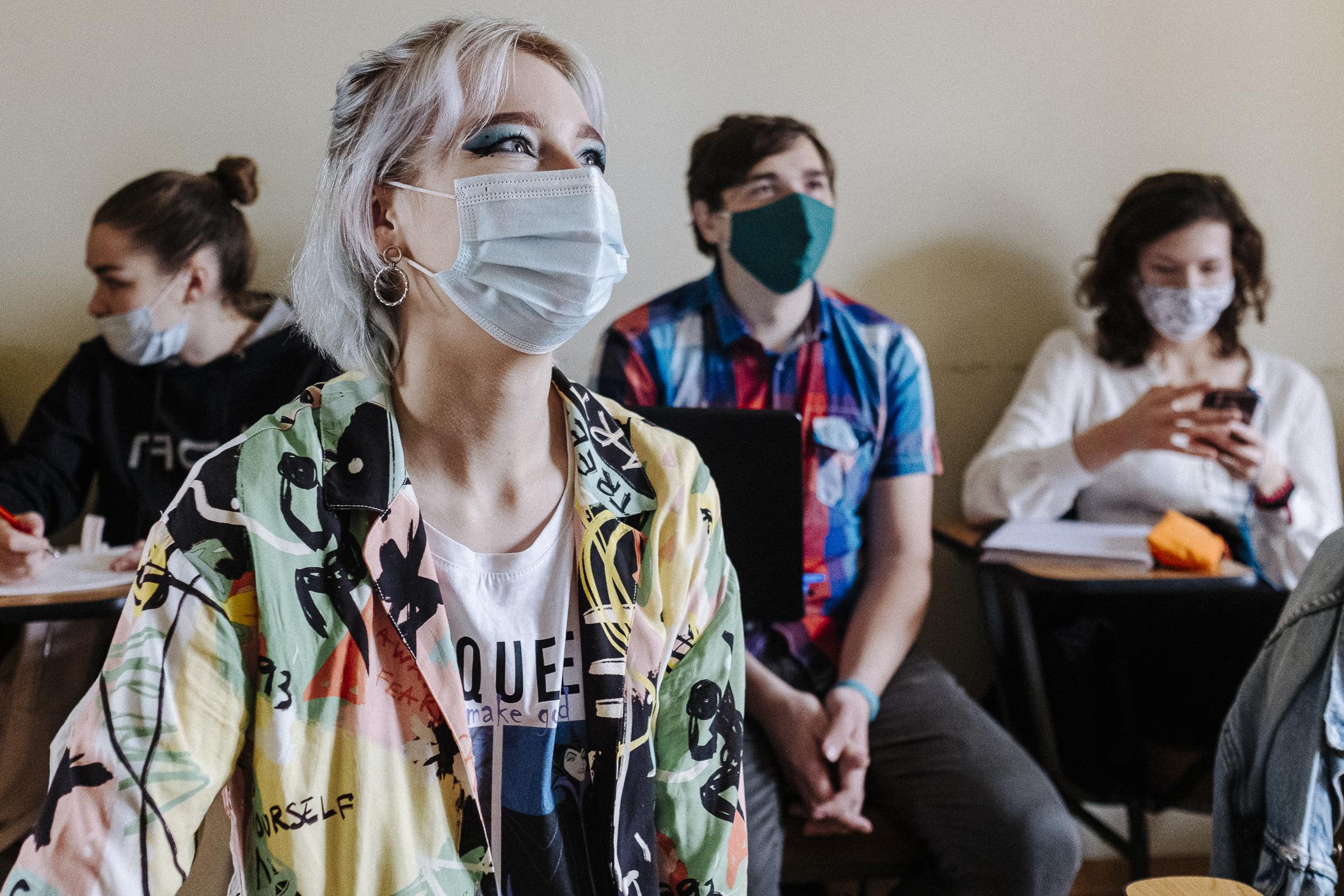
Valerya (19) is a student at EHU in Vilnius, Lithuania. She is starting her third year there. Valerya attends with her classmates a course within the framework of her specialisation «European Heritage» with professor Stsiapan Stureika. The course is held in Russian, as is the majority of the teaching at EHU, which welcomes more than 95% of its students from Belarus. This specialization allows students to update their knowledge of European history, which is largely truncated in Belarus. EHU offers Bachelors in Theatre, European Heritage, Media & Communication, International Politics & Economics and Visual Design.
Since then, more than 4,000 students, almost exclusively Belarusian, have taken classes in the humanities. At Bachelor’s and Master’s level, the professors involve their students, encourage them to express themselves. This is a totally new approach for most of these young students who are used to the Belarusian system which makes the official word of the professor the sole authority.
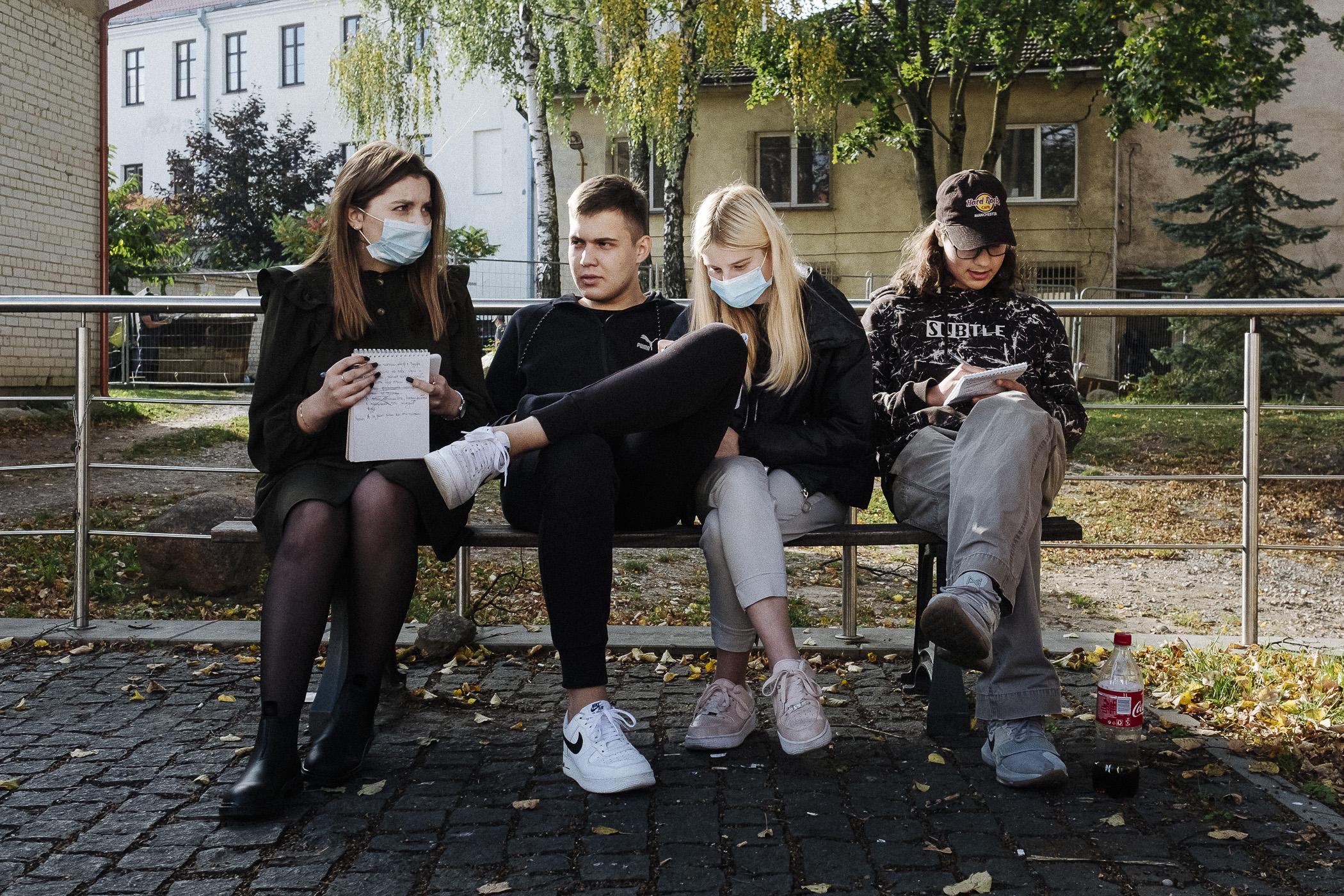
Inna, Anton, Ilaria (18) and Sergei (17) are first-year students at EHU. Their major is Visual Design. EHU offers Bachelors degrees in Theatre, European Heritage, Media & Communication, International Politics & Economics and Visual Design. All of them have relatives living in Belarus and are more or less involved in the widespread protest movement that has shaken their country since 9 August 2020.
Choosing EHU is not a trivial choice for these students. Thus, EHU has greatly contributed to educating generations of young Belarusians who are deeply committed to European values and who identify with them. The influence of EHU on the democratic and identity awareness of the Belarusian society during the 2020 presidential elections is proven.
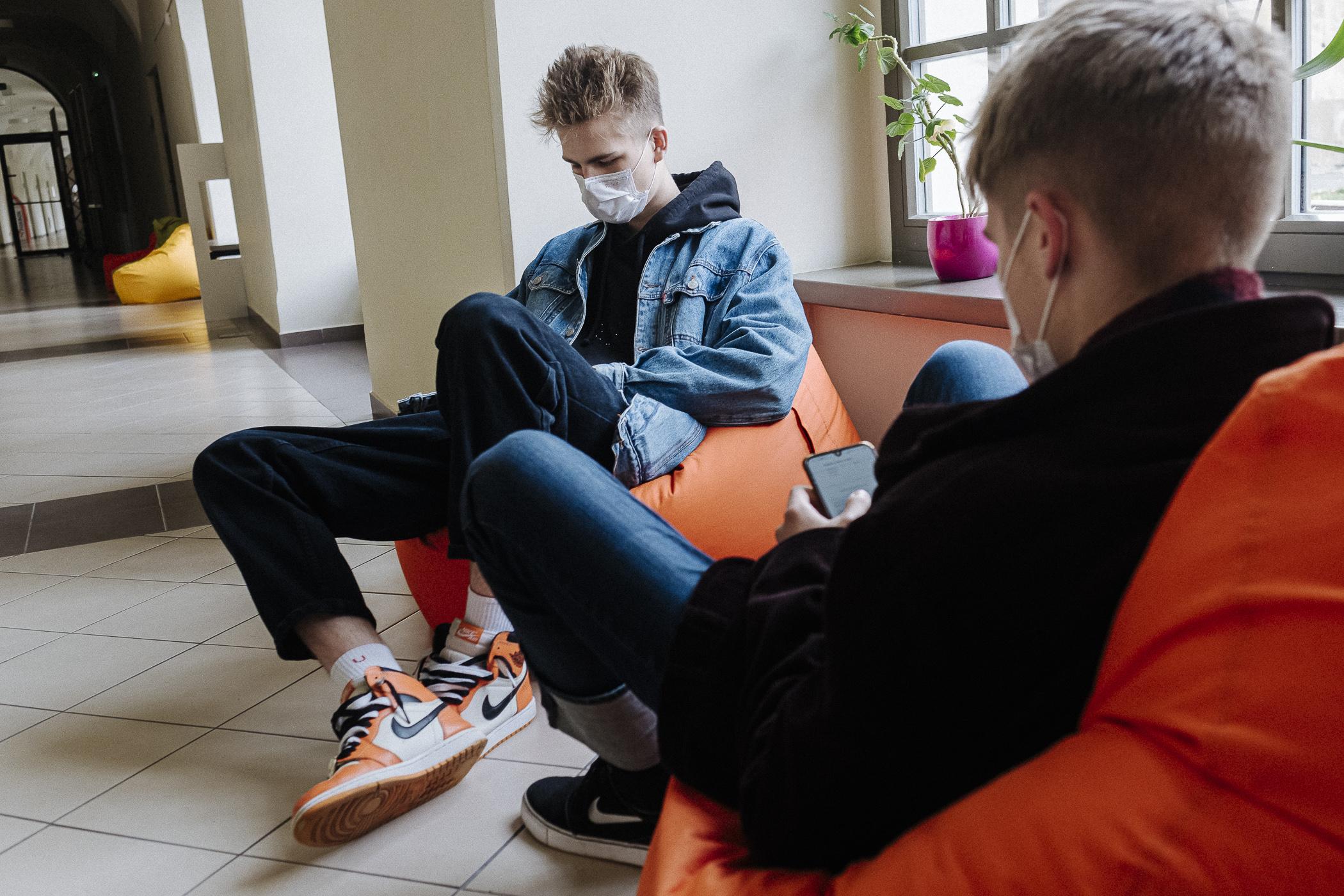
Hleb (left) and Kyril (right) are first-year students in the Visual Design speciality. For most students, studying at EHU is the best way to gain a foothold in Europe and to follow a course of study that leads to diplomas that are fully recognised throughout the world. EHU has recently moved into modern premises in what was once a monastery, thanks to the support of the Lithuanian government and the international community.
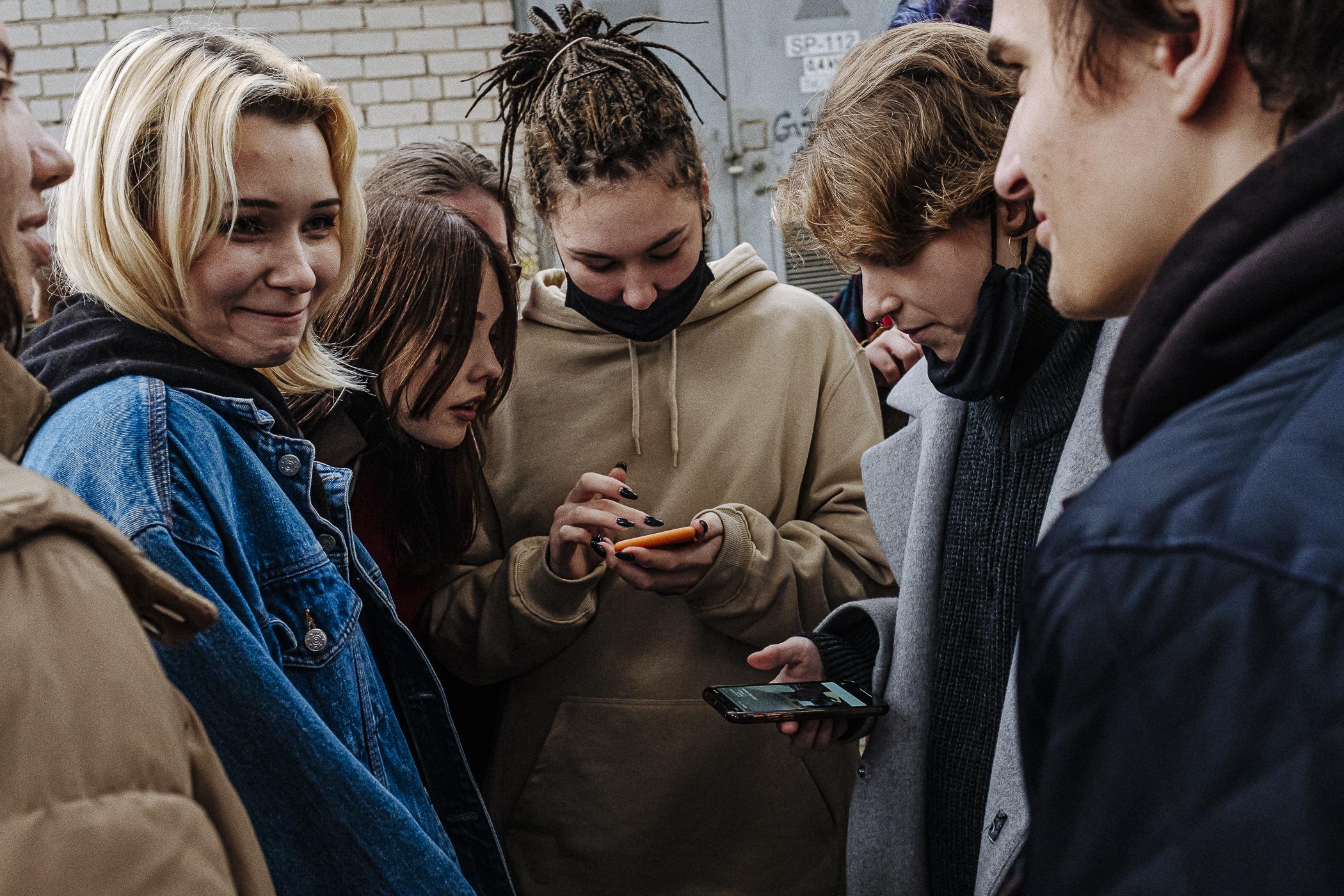
Anastasya (18), Elizaveta (18), Macha (18), Palina (17) and Nikolia (18) are first-year students at EHU. Between classes, they meet in the university courtyard to smoke a cigarette, discuss their new life in Lithuania and pass the time. All of them are from Belarus and have chosen to specialize in Visual Design at EHU because no university in Belarus can offer them this type of education. Tuition fees are much higher than in Belarus, even though a large majority of them are holders of scholarships offered by EHU.

The freshman students have to work on the subject: «What does it mean to be human? ». They are due to hand in an essay on this topic within two weeks, but their teacher has also given them plenty of time to deal with the subject. Palina (17) in the foreground improvised herself as a director and developed a whole choreography inspired by the theme. She had her classmates rehearse before showing this interlude for a few minutes to their teacher. All this is done without any supervision from their teacher, which is un- thinkable in Belarus where a large part of the teaching is modelled on the discourse of the teaching staff, without leaving any room for manoeuvre or initiative to the students.

During class, a senior student watches pictures of the historic meeting between Svetlana Tikhanovskaya and Angela Merkel that took place earlier in the day. The students attend the lecture of Professor Andrei Gornykh in one of the rooms on the top floor of the university, whose premises are a former convent renovated by the Lithuanian government. This start of the academic year 2020 is a bit special for these Belarusian students who are closely following the events that are shaking up their home country a few hundred kilometres away. All of them have relatives living in Belarus and more or less involved in the large protest movement that has shaken their country since August 9, 2020.

Kyril has gone into seclusion to follow the news from Belarus on his mobile phone. Like most of his compatriots, he uses the Telegram application, which is reputed to
be an efficient way of chatting in complete security without fear of his country’s police breaking its encryption. Since August 2020, many Belarusians living abroad have been frantically following the latest news from their loved ones thanks to the many channels on the Telegram application.
be an efficient way of chatting in complete security without fear of his country’s police breaking its encryption. Since August 2020, many Belarusians living abroad have been frantically following the latest news from their loved ones thanks to the many channels on the Telegram application.

Anastasya and Sacha (19) are revising together in the courtyard of their university an exercise given by one of their professors. Like the vast majority of students accepted at EHU, they took a year of preparatory classes in addition to their high school studies in Belarus to prepare for the EHU entrance exam. Anastasya and Sacha were in the same study group during this preparation which took place on average two Saturdays per week and during school vacations. Such training costs about 250 euros. The students of EHU, although many of them benefit from a scholarship, come from a privileged socio-cultural background.

Angelina (21) wears a sign and a red rose during a women’s march organized in the capital Vilnius in support of the Belarusian women who demonstrate every Saturday in Belarus against President Lukashenko. Angelina met on the spot with friends who are also fourth year students at EHU. Even if they do not consider themselves particularly politicized, almost all students support the opposition and participate in such events. This can be detrimental to them if they return to their country.

Svetlana Tikhanovskaya lives in exile in Vilnius and is considered by the European Union as the real winner of the August 2020 presidential elections in Belarus. We see her in front of her supporters at the end of a march in solidarity with the women of Belarus. Students from EHU participate in these initiatives like Ilaria (18) and Sergei (17) in their first year at EHU. For these young Belarusians, such gatherings are among their first demonstrations without fear of police repression. For most of them, studying at EHU is the only way to set foot in Europe and to follow studies whose diplomas are fully recognized in the academic world.


Yauhenia (19) carries on her shoulders the red and white flag symbol of the new Belarus in front of the embassy of Belarus. Belarusians and Lithuanian supporters meet there every evening to demonstrate peacefully and light candles in memory of the victims of repression in Belarus. Because of her activities, Yauhenia would be put in prison if she returned to her country. This is her last year at EHU, and since the presidential elections of 2020, she hopes to be able to return to her country to work on its reconstruction. If many Belarusians go into exile, it is largely due to the political repression in the country and the lack of opportunities for young graduates.

Hleb is a first-year Visual Design student. His parents are architects and have encouraged him to study abroad. His girlfriend is studying in France. Here he is studying graphic illustration or animation, which is quite rare in Belarus. He shares a room with two friends, also from Belarus, in a university hall of residence.

It is not uncommon to see a red and white Belarusian flag in the streets of the Lithuanian capital Vilnius, where the EHU university went into exile after being closed down in 2004 by President Lukashenko. There is a large Belarusian community in Vilnius, and the common history of the two countries also explains these many signs of solidarity with the Belarusian people. The Lithuanian government has been hosting the opposition Svetlana Tikhanovskaya since she had to flee her country following the presidential elections in August 2020. This flag symbolizes the opposition to president Lukashenko, in power since 1994.



I asked Sergey to pose for me in the living room of his friends Inna and Ilaria’s flat, where he had come to revise. Sergey is getting ready to go home after revising with two friends. Unlike their friends, who live in rooms provided by Vilnius University, Sergey, Inna and Ilaria have chosen to rent flats, most of which are on the outskirts of Vilnius.

Macha and Anastasya are revising in a café in the city. They were in the company of Sasha, who prefers to work at night, so he will be watching his friends work. A natural exuberant, he expresses the wish to work in the film industry or in directing, and is inexhaustible about his favourite directors and films, most of which are American.

Anastasya and Sacha (19) are shopping after school. Belarusian students like to enjoy the old city of Vilnius where EHU is located. In Belarus, there are almost no historical districts in cities like Minsk, and the areas where they live in Vilnius lack charm and have few options for going out or shopping. Sasha grew up in the Kaliningrad enclave and then in Belarus but his parents are Russian. He has Russian citizenship, even though he considers himself to be Belarusian. His father is an airline pilot for the national airline and has been on «leave» since the beginning of the crisis in August 2020 which is hitting the country’s economy hard.

Anya (20), Luba (19), Makar (19) and a friend of theirs go to a march organized by the Belarusian diaspora in Vilnius in support of the Belarusian women who demonstrate every Saturday in the main cities of the country to mark their opposition to the government of President Lukashenko. These students support the opposition and consider Svetlana Tikhanovskaya as their legitimate president. Her husband, Sergei Tikhanovsky is an influential blogger imprisoned since May 2020 two days after he declared his intention to run for the presidency. Svetlana Tikhanovskaya federates the voters of two candidates who were unable to run; Viktor Babariko who is in prison and Valery Tsepkalo who had his candidacy invalidated.

Elizaveta (18) shares a two-room apartment with her friend Macha (18). She calls her friend who is in Ikea to complete the meagre furnishings. The former tenants were Ukrainian workers. Like all students arriving from Belarus, the two friends had to spend two weeks in isolation and were only able to move in a few weeks ago. Elizaveta is originally from Babruysk, a city of 200,000 inhabitants in eastern Belarus. Her boyfriend was not admitted to EHU and is currently working as a waiter in Minsk. He is talking about coming to join her and applying for asylum in Lithuania. He does not imagine staying in Belarus.

Belarusian students at EHU can choose to live in rooms provided by the Vilnius University or they have the possibility to rent apartments themselves, most often in districts of Vilnius far from the historical city centre which are less expensive. Several first-year students, Elizaveta (18) and Macha (18) live in shared apartments in this building located 30 minutes’ walk from EHU. Such accommodation costs about 200 euros, while a university room shared with one or two other students costs 75 euros per person.

During an evening organised by EHU, a musician gets an audience of mostly Belarusian students up and dancing to a song calling on President Lukashenko to step down: «Lukashenko, it’s time to go». For the majority of these students, studying at EHU represents a real opportunity. The university is fully integrated into the Lithuanian programme and allows its students to join Erasmus, for example, which is not the case for Belarusian universities.

Johanna, Anastasya, Macha and Elizaveta are taking advantage of a break between lessons to go to McDonald’s. All four met in Minsk during preparatory courses they took in their final year of secondary school. The majority of EHU students have taken this type of preparatory course, which is used to make up for the shortcomings of Belarusian education compared with European standards, particularly in foreign languages and essay writing.